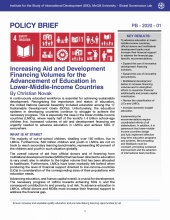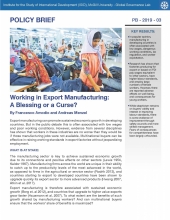A continuously educated workforce is essential for achieving sustainable development. Recognizing the importance and status of education, the United Nations General Assembly included education among the 17 Sustainable Development Goals (SDGs). Unfortunately, the education systems in developing countries continue to struggle to achieve the necessary progress. This is especially the case in the lower-middle-income countries (LMICs), where nearly half of the world’s 1.4 billion school-age children live.


McGill-ISID's Professor of Practice Christian Novak participated last week at the OECD's 2020 conference on Private Finance for Sustainable Development.

The Institute for the Study of International Development's regular newsletter, LATITUDE, is now available for download. Read up on our people, our research, our events and our programs!
Printed copies are available at the Institute in Peterson Hall.

ISID's Global Governance Lab releases a new policy brief by Francesco Amodio and Andreas Menzel, "Working in Export Manufacturing: A Blessing or a Curse". Read about it here!

Much of the influence on climate from air pollution in East Asia is driven by consumption in the developed countries of Western Europe and North America, according to research co-led by McGill University atmospheric scientist Yi Huang.
In a paper published online this week in Nature Geoscience, Huang and colleagues from China, the U.S. and U.K. report that international trade shifts the climate impacts of aerosols -- solid or liquid particles suspended in air -- from net consuming countries to net producing countries.
Since the 1960s, a number of programs have enabled promising students from developing countries to attend institutions of higher education in the global North with the goal of equipping them to contribute more effectively to development in their own countries. But, how do African scholarship recipients today understand their potential contributions to the development of their home societies? Does this differ among students who study in their home countries, in other African countries, or in the global North?

